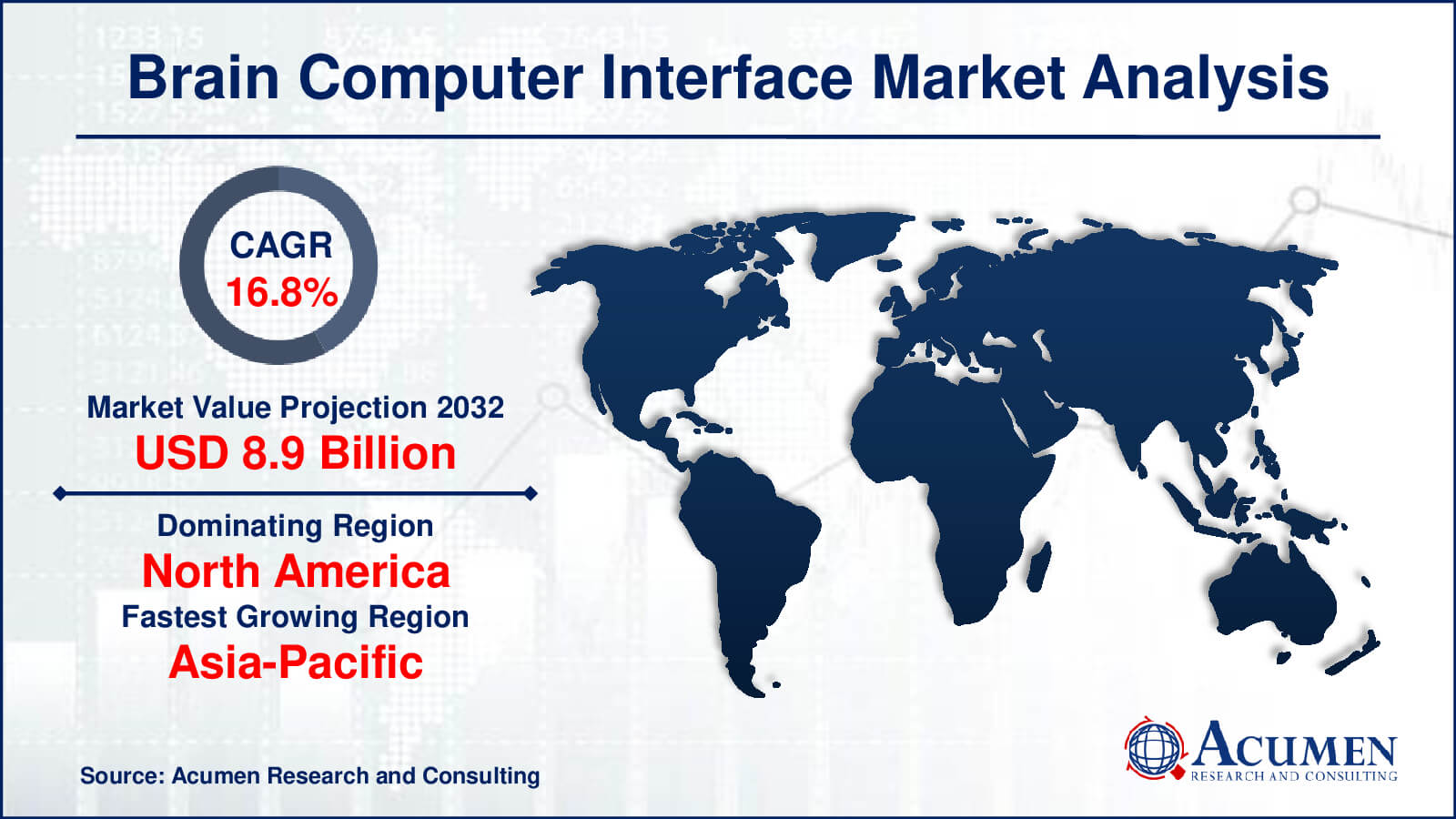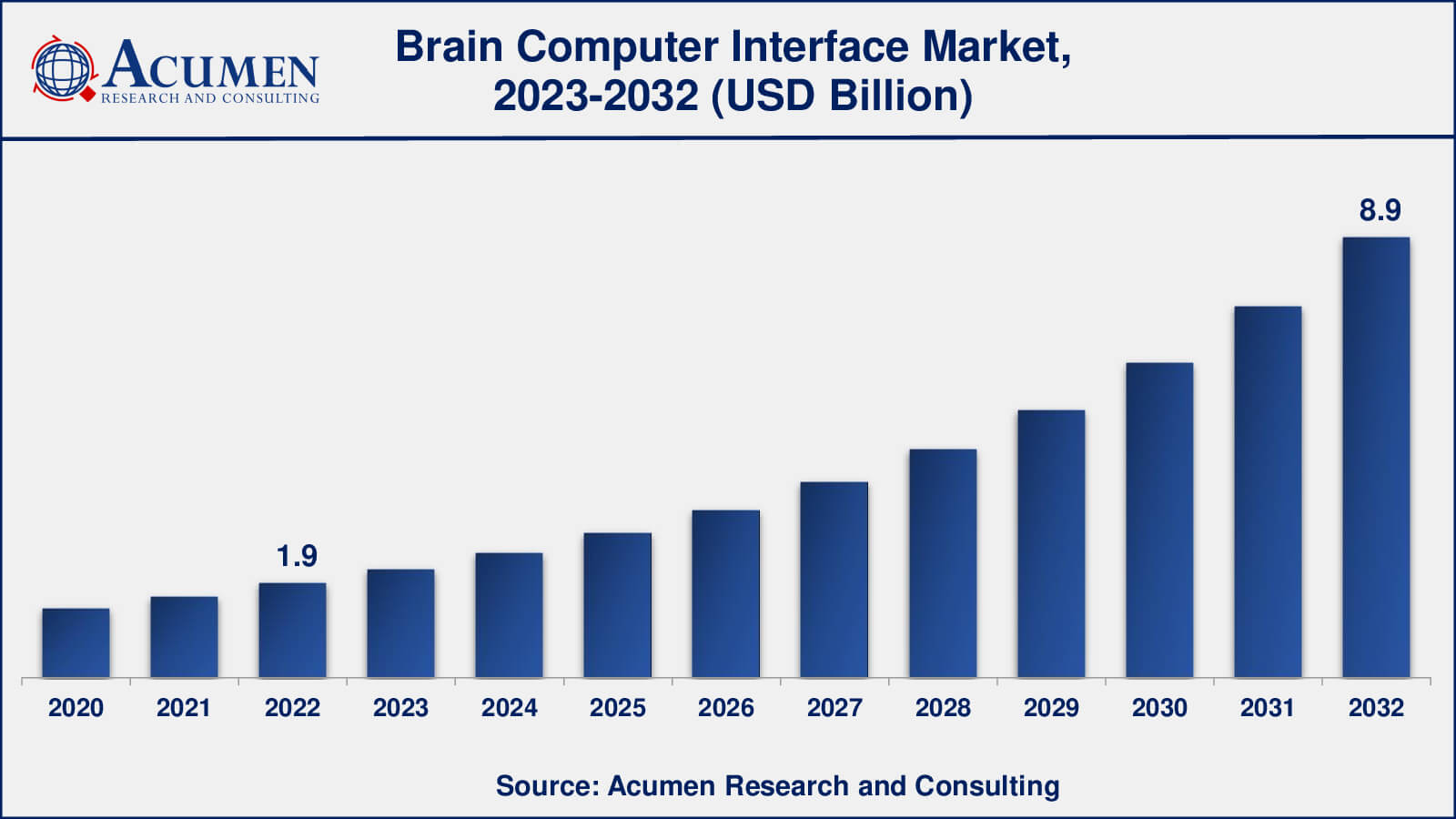June 2024
Brain Computer Interface Market gathered USD 1.9 Billion in 2022 and is expected to reach USD 8.9 Billion by 2032, growing at a CAGR of 16.8% from 2023 to 2032.
The global Brain Computer Interface Market gathered USD 1.9 Billion in 2022 and is expected to reach USD 8.9 Billion by 2032, growing at a CAGR of 16.8% from 2023 to 2032.
Brain Computer Interface Market Highlights

A brain-computer interface (BCI) sometimes referred to as a neural control interface, mind-machine interface, direct neural interface, or brain-machine interface, serves as a direct communication pathway between an enhanced or wired brain and an external device. The initial development of BCI technology primarily focused on helping paralyzed individuals control assistive devices using their thoughts. For example, BCIs are now utilized as neurofeedback training tools aimed at improving cognitive performance. Furthermore, the application of BCIs in various workplaces is akin to how individuals interact with machines and devices. The concept of human-device interaction forms a cornerstone of BCIs, as this technology facilitates direct communication between the brain and external devices.

Global Brain Computer Interface Market Dynamics
Market Drivers
Market Restraints
Market Opportunities
Brain Computer Interface Market Report Coverage
| Market | Brain Computer Interface Market |
| Brain Computer Interface Market Size 2022 | USD 1.9 Billion |
| Brain Computer Interface Market Forecast 2032 | USD 8.9 Billion |
| Brain Computer Interface Market CAGR During 2023 - 2032 | 16.8% |
| Brain Computer Interface Market Analysis Period | 2020 - 2032 |
| Brain Computer Interface Market Base Year |
2022 |
| Brain Computer Interface Market Forecast Data | 2023 - 2032 |
| Segments Covered | By Product, By Application, By End-Use Industry, And By Geography |
| Regional Scope | North America, Europe, Asia Pacific, Latin America, and Middle East & Africa |
| Key Companies Profiled | Advanced Brain Monitoring Inc., CAS Medical Systems, Compudemics, Compumedics Ltd., Covidien, PLC., Emotiv Incorporation, Integra Life Sciences Corporation, Mind Solutions, Mind Technologies Inc., Natus Medical, Inc., Nihon Kohden Corporation, and NeuroSky. |
| Report Coverage |
Market Trends, Drivers, Restraints, Competitive Analysis, Player Profiling, Covid-19 Analysis, Regulation Analysis |
Brain Computer Interface Market Insights
Rising Prevalence of Neurodegenerative Disorder Fuel the Demand for Brain Computer Interface (BCI) Market
The rising prevalence of neurodegenerative disorders, such as Alzheimer’s, Parkinson’s disease, and epilepsy, is projected to drive the demand for the overall brain-computer interface (BCI) market. According to the Alzheimer's Association, there is a surge in the number of Americans living with Alzheimer’s. More than 5 million Americans of all age groups have Alzheimer’s. Additionally, estimates show that 5.8 million Americans aged 65 and older were living with Alzheimer’s dementia in 2020. Eighty percent of them are aged 75 years or older, and one in 10 people age 65 and older (10%) has Alzheimer's dementia. Almost two-thirds of Americans with Alzheimer's are women. BCIs offer significant medical benefits in both the military and civilian industries. In cases of Alzheimer’s, implanted electrodes could improve memory for individuals dealing with head injuries, Alzheimer’s, and stroke conditions. Moreover, in July 2020, Synchron Inc. announced receiving funding from the Medical Research Future Fund (MRFF) through MTPConnect, the Australian Government BioMedTech Horizons (BMTH) program, to advance the commercialization of Synchron’s Stentrode. Stentrode is a minimally invasive brain-computer interface designed to restore functional independence, including the ability to text message, for people with paralysis by facilitating control of external personal devices without the need for open brain surgery.
Surge in Prevalence of Neuroprosthetic Conditions and Technological Advancement for Paralytic Patients Fuels the Brain-Computer Interface Market
The surge in the prevalence of neuroprosthetic conditions and technological advancements for paralytic patients is driving the adoption of brain-computer interface (BCI) technology. In 2019, the Food and Drug Administration (FDA) issued draft guidance for the development of devices to help people with paralytic conditions regain mobility and their sense of touch. BCI devices in neuroprostheses interface with the central or peripheral nervous system to restore lost motor or sensory capabilities. This guidance supports and demonstrates the potential risks to mitigate before the beginning of clinical studies.
Utility of Brain Computer Interface (BCI) Technology in Gaming Will Generate Significant Worldwide BCI Market Revenue
The utility of brain-computer interface (BCI) technology in gaming, virtual home control systems, and military communication enhances its applicability and drives market growth. In January 2021, gaming technology firm Valve encouraged developers to undertake brain-computer interface (BCI) as a mandatory application or project to revolutionize the gaming industry. The scanning process involves reading brainwaves through sensors placed in a headset. These gathered signals are then interpreted to enhance the gaming experience. Currently, at Valve, data collected from a player’s brain and body can be utilized to determine individual mental states. Additionally, improvements in sleep and emotional analysis and adjustments can be captured through BCI technology. Furthermore, brain-computer interface technology plays a vital role in improving artificial body parts.
Rising Geriatric Population Enhances the Demand for Brain Computer Interface Market
BCIs contribute to the improvement, repair, and enhancement of lost cognitive or motor function in the aging population. BCIs assist in improving the quality of life of the aging population, particularly in cognitive function, memory, control of smartphones, and limb support for movement. Furthermore, BCI technology plays a crucial role in addressing the growing susceptibility of the aging population to chronic conditions such as cardiovascular disorders, sleep disorders, and diabetes, thereby driving the BCI technology market in the forecast period.
Brain Computer Interface Market Segmentation
The worldwide market for brain computer interface is split based on product, application, end-use industry, and geography.
Brain Computer Interface Products
Based on product type, non-invasive BCIs held the largest market share in the past and are projected to continue their dominance throughout the forecast period. Factors contributing to the segment's growth include the widespread application of this technology in products such as headsets, amplifiers, and gaming sticks. Moreover, the high adoption of this technology in robotic devices is propelling demand worldwide.
In June 2019, a team of researchers from Carnegie Mellon University collaborated with the University of Minnesota to achieve a breakthrough in the field of non-invasive robotic device control. Through the utilization of non-invasive brain-computer interface (BCI) technology, researchers successfully developed the first-ever mind-controlled robotic arm capable of continuously tracking and following a computer cursor. BCIs have demonstrated a proven track record, coupled with excellent performance, in controlling robotic devices using only signals sensed from brain implants.
Brain Computer Interface Applications
As per the brain-computer interface market analysis, healthcare applications, particularly in neurorehabilitation and assisting individuals with neurological disorders, were prominent. BCIs were used to help restore communication and movement for people with disabilities. Disabilities restoration is closely related to healthcare, as BCIs played a vital role in restoring functionality and improving the quality of life for individuals with disabilities, including those with paralysis.
BCIs were utilized for research and development in repairing brain function, especially in cases of neurodegenerative diseases like Alzheimer's and Parkinson's disease. BCIs were integrated into smart home control systems, allowing users to control various devices and appliances through brain signals.
BCIs were used to assist individuals with severe communication impairments, allowing them to communicate and control computers or devices using their thoughts. BCIs were gaining traction in the entertainment and gaming industry, enhancing user experiences by allowing players to control games or interact with virtual environments using their brain activity.
Brain Computer Interface End-Use Industries
According to the brain computer interface market forecast, medical represent a dynamic and rapidly evolving sector within the technology industry. This segment encompasses a wide range of electronic devices designed for personal use and entertainment, including smartphones, televisions, laptops, tablets, gaming consoles, audio systems, and more. Medical have become an integral part of modern life, with constant innovations and advancements driving consumer demand. Key factors driving this industry include the ever-increasing demand for connectivity, portability, and enhanced features in electronic devices. Consumers expect not only high performance but also sleek designs and user-friendly interfaces, which have led manufacturers to continually push the boundaries of technology
Brain Computer Interface Market Regional Segmentation
North America
Europe
Asia-Pacific
Latin America
The Middle East & Africa
Brain Computer Interface Market Regional Analysis
North America Dominated the Brain Compute Interface (BCI) Market in the Past and Will Continue Its Trend in the Forecast Period
North America dominated the brain computer interface market in 2022 and is expected to continue this trend in the forthcoming years. Factors contributing to regional growth include high R&D investments and a large number of clinical trials conducted on brain devices in the North American region. The surge in the prevalence of neurodegenerative conditions, such as Alzheimer's, Parkinson's, and Huntington's disease, is expected to further boost regional growth. Furthermore, the rising demand for immersive gaming is driving the development of technologies involving augmented brain-computer interfaces, fueling the adoption of BCI technology in this region.
On the other hand, Asia-Pacific is expected to register the highest growth rate during the forecast period. A strong focus on research and development (R&D) activities, coupled with the launch of new products and innovations, has propelled the overall market for brain-computer interface (BCI) in the region.
Brain Computer Interface Market Players
Some of the top brain computer interface companies offered in our report includes Advanced Brain Monitoring Inc., CAS Medical Systems, Compudemics, Compumedics Ltd., Covidien, PLC., Emotiv Incorporation, Integra Life Sciences Corporation, Mind Solutions, Mind Technologies Inc., Natus Medical, Inc., Nihon Kohden Corporation, and NeuroSky.
Looking for discounts, bulk pricing, or custom solutions? Contact us today at sales@acumenresearchandconsulting.com
June 2024
July 2022
July 2022
June 2024